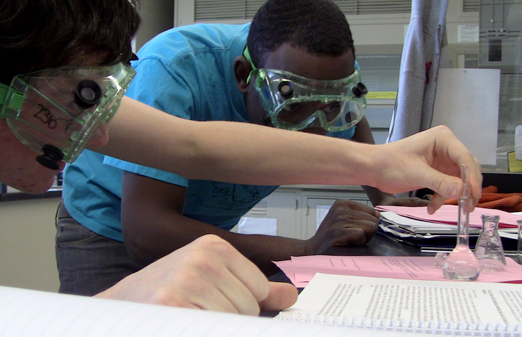
The School of Science and Engineering will soon offer students the option to major in biochemistry, faculty said.
Daniel Freedman, interim dean of the school, said students could begin enrolling in the 70-plus credit biochemistry program in fall 2012. This new major program of study took two and a half years to formulate.
The program was created by grouping existing biology and chemistry courses and developing new classes specific to this scientific field. Freedman said a biochemistry program was a natural fit for the School of Science and Engineering, which added faculty with backgrounds in this field as others began to retire in the last 10 years.
“This is something that we have kind of talked about for a while, and in the turnover in both departments we really ended up hiring some real expertise in biochemistry. It’s not just one or two people: it’s four or five who are all working in this interdisciplinary area,” he said. “It’s really something that we probably should have done a while ago, but it just became a no-brainer that we really could not only do it but do it very well because of the people and the facilities that we have.”
Since Freedman began teaching chemistry at SUNY New Paltz in 1999, every professor in the program from that time has retired. He also said there is only one faculty member who has been teaching at the college before 1992 in the Biology Department.
These developments allowed for new faculty to join each department, some with experience in the new interdisciplinary field the school will be introducing as a major program of study. This group of faculty includes Preeti Dhar, a Chemistry Department member who has been teaching biochemistry since 1999 and will serve as the director of the new program.
Biochemistry is the chemistry of life, according to Dhar, and can be broadly divided into three main areas. The first one deals with the study of the four macromolecules — proteins, carbohydrates, fats and nucleic acids — found in our cells. How they interact with each other and how they function is a direct result of their structure. The second area deals with the totality of reactions occurring in the body and the third area pertains to genetic information, she said.
Dhar said this new major track will attract pre-health career students and current molecular biology majors who minor in chemistry to get additional training in biochemistry.
“Students majoring in biochemistry would be those who already have expressed an interest in a formal interdisciplinary biochemistry experience,” she said. “The program will be constituted as a collaboration between the Biology and Chemistry Departments but will provide a separate and unique educational experience compared to current tracks in both chemistry and biology.”
Dhar said biochemistry majors are offered at most four-year schools, so it was time that SUNY New Paltz offered the major. Current students enrolled in science courses at the college agreed.
Julia Vogel, a fourth-year student who has taken biology courses at the college since transferring to SUNY New Paltz, said this new program of study is one the school needs to attract students interested in pursuing careers in medicine.
“I think students will be interested in the major and it will help the college create a better program for premedical students, which is lacking right now,” Vogel said.
Dhar said students interested in this sort of career path or others that are seeing “tremendous change” occur as scientific breakthroughs are made can enter this interdisciplinary major and resources from both the Biology and Chemistry Departments would be “pooled in.”
According to Dhar, two new courses have been designed for this major to accompany other existing courses in both biology and chemistry. The two new courses are Protein Structure and Function, to be taught by Jeff Reinking of the Biology Department, and a Capstone biochemistry lab experience that students will take in the final year of the program upon completion of other required biochemistry courses. These include the protein course and biochemistry I, II and a lab course, Dhar said.
Freedman said a student majoring in biochemistry would have to build a background in each field before taking the specific courses for their major. Students are required to take 16 credits of biology and chemistry while choosing a four credit biology elective and a three credit chemistry elective.
Although many of the courses that make up the major already existed prior to the offering of the biochemistry major, Freedman said, the new program will offer students a unique experience and the department will continue to develop its own identity as time progresses.
“There are already a lot of students who really wanted to take this group of courses so what we did was repackage those so it was a major,” he said. “Although a lot of these courses were already offered, this provides students with a unique way to group courses that people would have a real natural interest in. With the addition of new courses in the upper levels, it provides something very different than what was offered before.”
